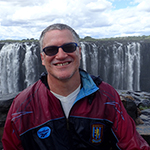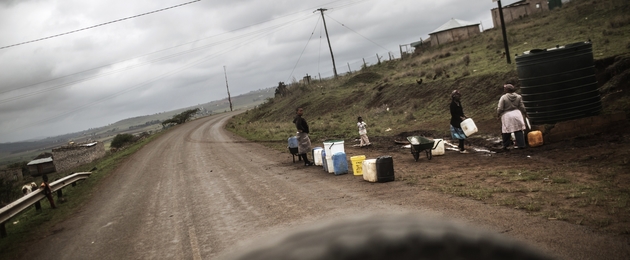In a climate changing world, one of the most vital resources is global fresh water. That is, how much is left, is this dwindling as the planet heats up – and, if so, who gets access to it, and at what cost?
The genesis of my recently published science fiction novel WATER MUST FALL, was the then pending Day Zero crisis in Cape Town. This was the predicted apocalyptic moment (April 12th, 2018) when Cape Town would become the first major world city – of approximately 4 million people, many in informal settlements – to run out of water, after a sustained drought over preceding years. Level 5 water restrictions were already in place and mass migration and political chaos at unprecedented levels, was expected.
Public domain images of Cape Town’s Theewaterskloof Dam, image (left: 2014 to right; 2018).
But then, thankfully, the rains came (Alexander, 2019).
As can be seen in the photo on the above, a central problem is that with global warming comes increasing drought – and with drought, comes famine and death. Water is a key essential to life – people will die far more quickly without water, than without food. The life estimate for humans is three days or so for water, three weeks or so for food. And, without water, no food can be grown. Water is thus key to both ‘food security’ and immediate survival. Given these contingencies, access to water is fundamental for all humans. So ‘ownership,’ or human access to water is crucial. And, if ownership is insisted upon, who owns water, owns life.
At the turn of the century, in a town called Cochabamba in Bolivia, South America, the opening salvo of what is emerging as one of the twenty first century’s most hidden, yet crucial human conflicts, the so-called ‘Water Wars,’ was fired (Shiva, 2002; Subramaniam, 2018). The town’s water supply was privatized (sold) to a company called Semapa. The company drastically raised water costs when suppliers further down the line claimed delivery costs would rise, to accommodate the building of a new dam. A community coalition rose in protest at unaffordable prices for so many, the group known as ‘Coordination in Defence of Water and Life.’ There was, of course, a swift and brutal response, including police killing a protestor. However, on 10th April 2000, the national government reached an agreement with the community activist group, to reverse the privatization and reduce water costs and improve access.
And then, these largely hidden Water Wars moved closer to home. Water stress is when demand outstrips available supply and, with increasing rapid urbanisation in South Africa this century, inadequate and failing infrastructure resulted in the death of at least three (maybe up to fifteen) babies, drinking sewage infected water in Bloemhof and Motluhung, near Pretoria. Following resident protests about their lack of access to clean water, there were police shootings and the death of several protestors (Nicolson & Lekgowa, 2014).
Finally, even in one of the richest countries in the world, the United States of America, the Water Wars there are most vividly seen in the Flint Water Crisis (from 2012 onwards) whereby the state of Michigan, whilst supplying water in tandem with companies to the poorest communities, sought to maximise profits by neglecting treatment on dangerous and outdated supply pipes from the Flint River. Toxic amounts of lead entered the water system, leading to birth defects and brain damage, particularly in children within the African American population. Two private companies profiteering off water and several state officials responsible (who also tried to cover up the crisis) were charged. Report findings indicated systemic racism was at play in decisions made by complicit companies (CNN, 2019), just one deadly thread in the enduring structural racism that led to the latest murder in the US of George Floyd.
In these Water Wars stories, the poorest citizens always pay the heaviest price, for companies profiteering off water, or states not ensuring access to clean water. As we remember those who protested in the Struggle for freedom and democracy (June 16th), Youth Day, so too let us remember that one of those hard won rights is stated in our precious Constitution: Everyone has the right to have access to sufficient food and water.

Nick Wood is a South African-British clinical psychologist and Science Fiction (SF) writer, with published short stories collected in LEARNING MONKEY AND CROCODILE (Luna Press, 2019). Nick’s latest SF novel is WATER MUST FALL (NewCon Press, 2020). Nick can be found at Twitter: @nick45wood or http://nickwood.frogwrite.co.nz/
**This article was contributed by a guest blogger. This blog entry does not necessarily represent the position or opinion of Amnesty International South Africa.


